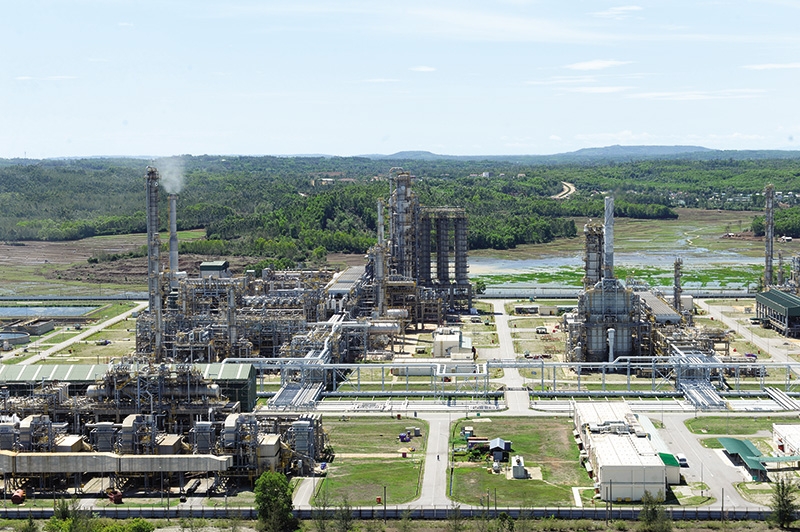BSR seeks foreign partners for more multifaceted growth
 |
| Dung Quat Oil Refinery is developed at Dung Quat Economic Zone in the central province of Quang Ngai |
The $3 billion Dung Quat is the first-ever oil refinery in Vietnam with an annual capacity of 6.5 million tonnes of crude oil. The refinery applies cutting-edge technologies from the US and the EU and is capable of processing about 57 different types of crude oil with high API quality and low sulfur content. Over the past years, BSR has maintained the stable operation of the refinery at an average output of 103-105 per cent of its designed capacity. The refinery uses 85 per cent of locally-sourced materials and 15 per cent of imported materials.
After years of research, BSR evaluated and selected 67 types of crude oil that meet technical standards for processing at Dung Quat. It can process crude oil from different regions of the world such as Azeri (Azerbaijan), Qua Iboe, Escravos, Bonny Light (Nigeria) as well as Te Giac Trang (White Rhino), Su Tu Den (Black Lion), and Chim Sao (Vietnam). In addition to evaluating suitable types of crude oil, BSR is seeking oil supply partners after the Bach Ho (White Tiger) field is running dry after 10 years.
In 2017, BSR signed crude oil supply agreements with two partners, Socar Trading S.A. and Glencore Singapore as part of BSR’s sustainable development strategy. Accordingly, Glencore Singapore will supply crude oil to the refinery during 2017-2021, while Socar Trading S.A. will provide Azeri Light crude and 56 other types of crude oil in the 2018-2021 period. The two sides will endeavour to maintain the supply until 2040.
BSR is also researching new oil types to diversify its product portfolio. In May, it began to process one million barrels of WTI Midland crude from the US, supplied by BP. At a recent meeting with the US Assistant Secretary of State, BSR chairman Le Xuan Huyen said that they would import roughly two million barrels of WTI Midland crude from the US via PV Oil Singapore in the second half of 2019.
BSR has been operating as a joint stock company since July 1, 2018 with the charter capital of VND31 trillion ($1.33 billion), 92 per cent of which is owned by the state. Under the equitisation plan, BSR will put the state-owned stake on sale at the stock exchange. The company is actively seeking strategic investors to reduce state ownership to 43 per cent.
Many international oil and gas groups have expressed interest in investment and partnership opportunities with BSR, which is looking for strategic partners with strong financial capacity, crude oil resources, and experience in oil refining.
At present, BSR is implementing a project to upgrade and expand Dung Quat Oil Refinery, which is slated to be completed in 2023. The project aims to increase the plant’s annual capacity to 8.5 million tonnes of crude oil. The investment includes some new technology workshops, increasing the capacity of existing workshops, transforming auxiliary workshops, as well as adding crude oil tanks, intermediate tanks, and product tanks. The new workshops are equipped with state-of-the-art technologies from world-renowned providers like the US’ UOP, France’s Axens, Italy’s KT, and the Netherlands’ Jacobs. The total investment of the project amounts to $1.8 billion, 70 per cent of which is from commercial loans. A number of foreign credit institutions have been interested in the project, so it is feasible for BSR to borrow a loan of $1.2 billion.
In addition, BSR also considered integrating gas from the central region for deep processing. Moreover, BSR can take advantage of this source to reduce costs and produce potential petrochemical products. The combination and integration of the central region’s gas into Dung Quat will form a major oil refinery centre in Central Vietnam.
Besides developing technologies and researching new products, BSR also focuses on strategic management to optimise production and business activities, as well as improve competitiveness in the coming period. In July 2018, BSR signed a co-operation agreement on improving the competitiveness of Vietnam’s oil refineries with Japan Petroleum Co-operation Center (JCCP). Boston Consulting Group - BCG (US) has also taken the first steps in co-operating with BSR to improve the efficiency of the refinery. BCG has sent consultants to study the status of Dung Quat to analyse, advise, and propose BSR business strategies and action programmes to improve profit margins. SCG of Thailand and BSR inked a memorandum of understanding on strengthening cooperation in the field of petrochemical refining.
What the stars mean:
★ Poor ★ ★ Promising ★★★ Good ★★★★ Very good ★★★★★ Exceptional
 Tag:
Tag:
Related Contents
Latest News
More News
- Masan Consumer names new deputy CEO to drive foods and beverages growth (February 23, 2026 | 20:52)
- Myriad risks ahead, but ones Vietnam can confront (February 20, 2026 | 15:02)
- Vietnam making the leap into AI and semiconductors (February 20, 2026 | 09:37)
- Funding must be activated for semiconductor success (February 20, 2026 | 09:20)
- Resilience as new benchmark for smarter infrastructure (February 19, 2026 | 20:35)
- A golden time to shine within ASEAN (February 19, 2026 | 20:22)
- Vietnam’s pivotal year for advancing sustainability (February 19, 2026 | 08:44)
- Strengthening the core role of industry and trade (February 19, 2026 | 08:35)
- Future orientations for healthcare improvements (February 19, 2026 | 08:29)
- Infrastructure orientations suitable for a new chapter (February 19, 2026 | 08:15)





















 Mobile Version
Mobile Version